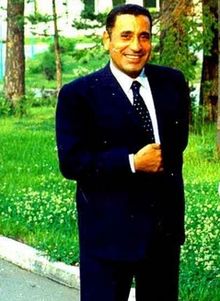
Back محمد حسنين هيكل Arabic محمد حسنين هيكل ARZ মুহাম্মাদ হাসনাইন হাইকল Bengali/Bangla Muhammad Heikal German Mohamed Hassanein Heikal Spanish محمد حسنین هیکل Persian Muhammad Hassanein Heikal Finnish Mohamed Hassanein Heikal French מוחמד חסנין הייכל HE Mohamed Hassanein Heikal ID
Mohamed Hassanein Heikal | |
|---|---|
 Heikal in 1966 | |
| Born | 23 September 1923 |
| Died | 17 February 2016 (aged 92) Cairo, Egypt |
| Education | American University, Cairo |
| Occupation | Journalist |
| Years active | 1942–2003 |
| Spouse | Hedayt Elwi Taymour (1955–2016, his death) |
| Children | 3 sons |
| Family | Heikal |
Mohamed Hassanein Heikal (Arabic: محمد حسنين هيكل; 23 September 1923 – 17 February 2016) was an Egyptian journalist. For 17 years (1957–1974), he was editor-in-chief of the Cairo newspaper Al-Ahram and was a commentator on Arab affairs for more than 50 years.[1]
Heikal articulated the thoughts of President Gamal Abdel Nasser earlier in his career.[2] He worked as a ghostwriter for the Egyptian president Gamal Abdel Nasser and represented the ideology of pan-Arabism.[3] Heikal was a member of the Central Committee of the Arab Socialist Union. He was appointed minister of information in April 1970 but resigned from government in 1974 over differences with Anwar Sadat.[4]
In September 2003, upon reaching the age of 80, Heikal wrote an article in the monthly magazine Weghat Nazar (where he had been writing for some time) that the time had come for an "old warrior" to put down his pen and take to the sidelines. Heikal stressed that his decision to stop writing did not mean he would disappear, but rather take to the sidelines to observe more thoroughly. In the article he also recounted a lot of the events that occurred during his life and formed his experience including his first mission as a reporter in the Second Battle of El Alamein in 1942, his friendship with Nasser and his relationship with Sadat. In addition he opened his financial records stating the salaries he had received in all his jobs and posts.
In a 2007 audience with British journalist Robert Fisk, Heikal spoke about the situation in Egypt and criticized Egyptian president Mubarak, saying that Mubarak lives in a "world of fantasy" in Sharm al Sheikh.[5] These comments stirred an uproar within Egyptian society, both for and against Heikal. Heikal did not comment on this criticism except later on Al Jazeera, where he said that he stands by what he has said earlier, adding that Mubarak had not entered political life until very late, which means he lacks necessary experience.
- ^ There isn't a target in Afghanistan worth a $1m missile - Mohamed Heikal, the Arab world's foremost political commentator, The Guardian, Stephen Moss, 20 October 2001
- ^ Chasing the paper trail, Al-Ahram, 26 July 2007
- ^ Efraim Karsh. (2007). Islamic Imperialism: A History. New Haven, p. 149-169
- ^ Robert Dreyfuss. (2005). Devil's Game: How the United States helped unleash Fundamentalist Islam. New York: Metropolitan Books, p. 151. ISBN 9780805076523
- ^ Robert Fisk. (13 October 2007).Mohamed Hasseinein Heikel: The wise man of the Middle East Archived 13 October 2007 at the Wayback Machine, The Independent, Retrieved 9 April 2009.
© MMXXIII Rich X Search. We shall prevail. All rights reserved. Rich X Search